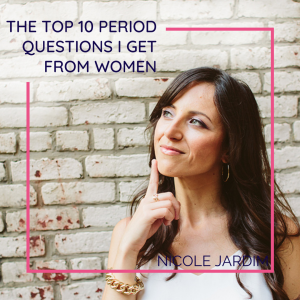These Are The Top 10 Period Questions I Get From Women:
Question #1: How long is a normal period?
In my experience, a 3-day period is the norm for many women. Ideally, I like to see a period that is about 4-5 days long. This signifies that you had adequate estrogen building up your uterine lining earlier in your cycle.
Some women have 6-7 day periods and that is fine too, but a period that is 8 days or longer is too long and can set you up for anemia.
Read more about how long your period should be here: https://nicolejardim.com/how-long-should-your-period-be/
Question #2: What color should your period blood be?
It should start with a nice saturated red color that’s vibrant and healthy, kind of like cranberry juice. If your blood is heavy, dark, clotted or clumpy (resembles frozen crushed up blueberries), this is indicative of high estrogen levels, while if your blood is thinned out, too little, lighter in color (kind of like watered down cranberry juice) this can indicate your estrogen is too low.
You can read more about what a normal period looks like here: https://nicolejardim.com/what-is-normal-menstrual-cycle-period/
Question #3: What’s the normal length of a menstrual cycle?
An optimal cycle length should be anywhere from 25 to 35 days. If your cycle is 24 days or less then you might have a condition called Luteal Phase Defect, which means that your luteal phase or the second half of your cycle after ovulation is too short to either get pregnant or stay pregnant.
You can read more about the menstrual cycle here: https://nicolejardim.com/what-is-normal-menstrual-cycle-period/
Question #4: How much blood does a woman lose during menstruation?
Normal periods are defined as vaginal bleeding that occurs every 25-35 days, and lasts for 3-7 days, with an average blood loss range of 30-5o milliliters. Each soaked regular pad or tampon holds roughly 5ml of blood, so it’s totally fine to soak 6-10 pads/tampons during each period.
You can read more about menstruation here: https://nicolejardim.com/heavy-periods/
Question #5: How long should the luteal phase be?
The luteal phase begins the day after ovulation and lasts until the day before your period. It should be 10-14 days long but closer to 14 days is best. It physically cannot last longer than 16 days – you’re either pregnant or you did not ovulate.
If it is less than 10 days long then you might have Luteal Phase Defect.
Read more about the menstrual cycle here: https://nicolejardim.com/what-is-normal-menstrual-cycle-period/
Question #6: Can you have sex on your period?
Yes, of course you can! In fact, research has found that many women find period sex to be the only thing that gives them any relief from their cramps and headaches. Since levels of progesterone—the hormone that tends to suppress libido—are low after you start your period, and estrogen – one of the hormones that revs your sex drive – begins it’s ascent, your desire for sex may in fact increase during your period.
Read more about your period here: https://nicolejardim.com/10-period-facts/
Question #7: How do you test your cervical fluid?
Start by checking out your undies every day. Is there anything there? What does it look like and feel like? Sticky, creamy, slippery, stretchy, watery, clear, opaque, white, slightly yellowish?
After your period you might have no cervical fluid or feel “dry” down there. Please keep in mind that our vaginas are never really dry, there is always going to be some moisture. As you approach ovulation which typically happens in regular cycles between days 12-17, you’ll find that your cervical fluid takes on a wetter consistency. Usually it starts out creamy and then turns to watery, eggwhite-like, slippery, clear or slightly cloudy, stretchy. You might even feel a gush around ovulation time. Make notes on all of this.
Read more about how to test your cervical fluid here: https://nicolejardim.com/how-to-start-using-natural-birth-control/
Question #8: Why do I get diarrhea during my period?
This is completely normal. Right before your period, progesterone levels drop dramatically causing the uterine lining to shed. This process releases hormone-like lipids called prostaglandins, which stimulate muscle contractions in the uterus. Due to its close proximity to the uterus, the bowel is one of the first organs to be affected by excess prostaglandins. Once they infiltrate the bowel, their effect is the same as it is in the uterus. They contract the muscles in the intestinal wall causing that wave-like ripple effect that can lead to diarrhea.
Read more about how your period affects your digestion here: https://nicolejardim.com/howyourperiodaffectsdigestivetract/
Question #9: Why do I get sore breasts before period?
In the first half of the cycle, estrogen is produced by our ovaries which begins to stimulate the growth of milk ducts in our breasts. After ovulation, estrogen drops and progesterone takes center stage, stimulating the development of milk glands to prepare for the production of your baby’s first food, if you were to become pregnant. When your hormone levels are balanced, these changes are controlled and can go, more or less, unnoticed. However, if your hormones are out of balance, your breast cells can become overwhelmed causing pain and soreness.
Read more about breast pain here: https://nicolejardim.com/the-real-reason-…fore-your-period/
Question #10: How do I know if I’m ovulating?
The best way to figure out if you are ovulating is to start tracking your basal body temperature and your cervical fluid patterns. Your basal body temperature is your body’s temperature first thing upon awakening. Before ovulation, your waking temperatures tend to be low, anywhere from 97.0 – 97.7. A day or two after ovulation, they will typically rise at least several tenths of a degree and stay elevated until your next period. This is caused by the production of the heat-inducing hormone, progesterone.
Read more about how to track your cycle here: https://nicolejardim.com/what-is-normal-menstrual-cycle-period/



